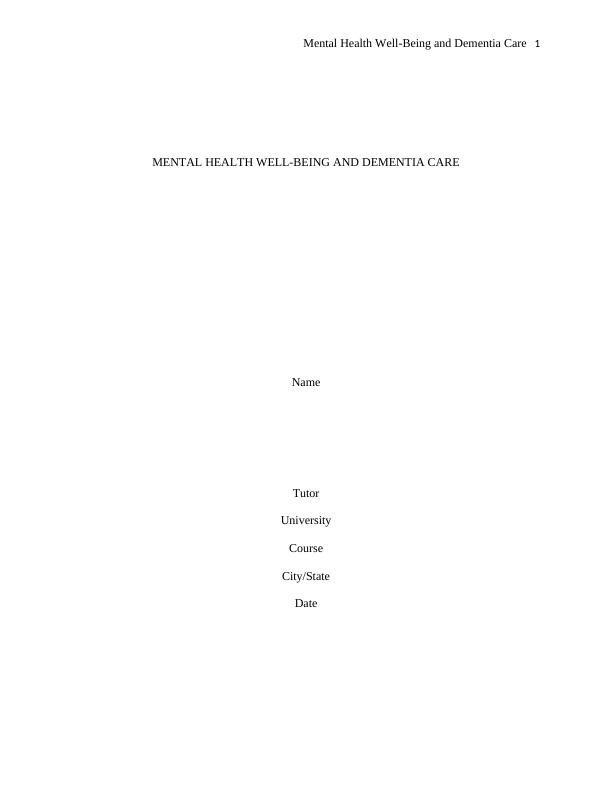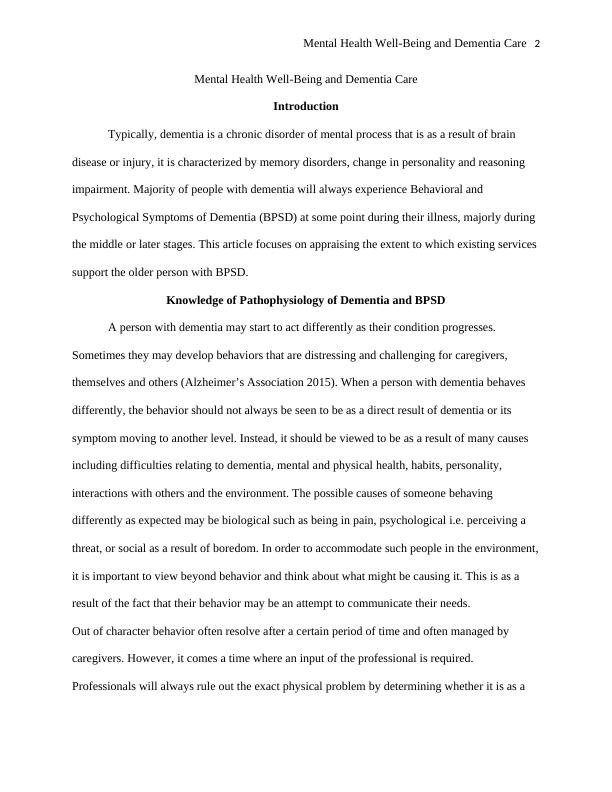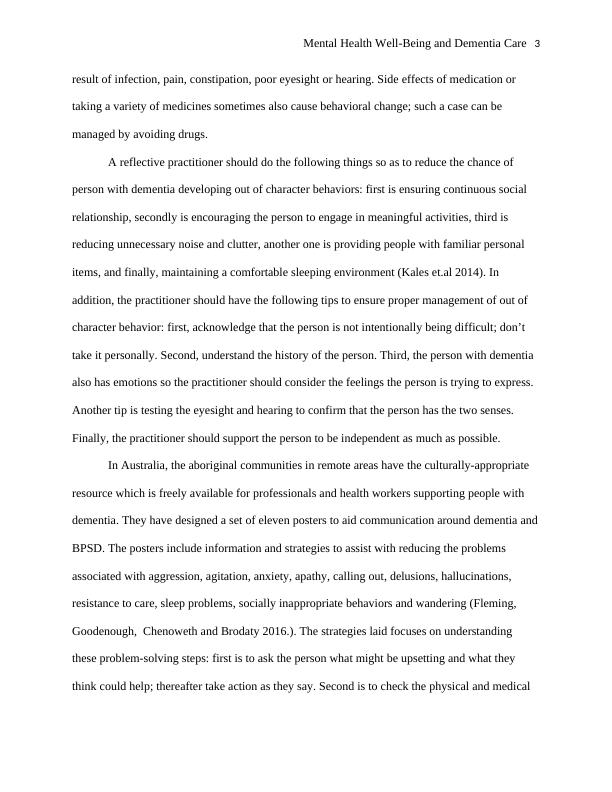Mental Health Well-Being and Dementia Care
Added on 2023-06-07
10 Pages2621 Words423 Views
Mental Health Well-Being and Dementia Care 1
MENTAL HEALTH WELL-BEING AND DEMENTIA CARE
Name
Tutor
University
Course
City/State
Date
MENTAL HEALTH WELL-BEING AND DEMENTIA CARE
Name
Tutor
University
Course
City/State
Date

Mental Health Well-Being and Dementia Care 2
Mental Health Well-Being and Dementia Care
Introduction
Typically, dementia is a chronic disorder of mental process that is as a result of brain
disease or injury, it is characterized by memory disorders, change in personality and reasoning
impairment. Majority of people with dementia will always experience Behavioral and
Psychological Symptoms of Dementia (BPSD) at some point during their illness, majorly during
the middle or later stages. This article focuses on appraising the extent to which existing services
support the older person with BPSD.
Knowledge of Pathophysiology of Dementia and BPSD
A person with dementia may start to act differently as their condition progresses.
Sometimes they may develop behaviors that are distressing and challenging for caregivers,
themselves and others (Alzheimer’s Association 2015). When a person with dementia behaves
differently, the behavior should not always be seen to be as a direct result of dementia or its
symptom moving to another level. Instead, it should be viewed to be as a result of many causes
including difficulties relating to dementia, mental and physical health, habits, personality,
interactions with others and the environment. The possible causes of someone behaving
differently as expected may be biological such as being in pain, psychological i.e. perceiving a
threat, or social as a result of boredom. In order to accommodate such people in the environment,
it is important to view beyond behavior and think about what might be causing it. This is as a
result of the fact that their behavior may be an attempt to communicate their needs.
Out of character behavior often resolve after a certain period of time and often managed by
caregivers. However, it comes a time where an input of the professional is required.
Professionals will always rule out the exact physical problem by determining whether it is as a
Mental Health Well-Being and Dementia Care
Introduction
Typically, dementia is a chronic disorder of mental process that is as a result of brain
disease or injury, it is characterized by memory disorders, change in personality and reasoning
impairment. Majority of people with dementia will always experience Behavioral and
Psychological Symptoms of Dementia (BPSD) at some point during their illness, majorly during
the middle or later stages. This article focuses on appraising the extent to which existing services
support the older person with BPSD.
Knowledge of Pathophysiology of Dementia and BPSD
A person with dementia may start to act differently as their condition progresses.
Sometimes they may develop behaviors that are distressing and challenging for caregivers,
themselves and others (Alzheimer’s Association 2015). When a person with dementia behaves
differently, the behavior should not always be seen to be as a direct result of dementia or its
symptom moving to another level. Instead, it should be viewed to be as a result of many causes
including difficulties relating to dementia, mental and physical health, habits, personality,
interactions with others and the environment. The possible causes of someone behaving
differently as expected may be biological such as being in pain, psychological i.e. perceiving a
threat, or social as a result of boredom. In order to accommodate such people in the environment,
it is important to view beyond behavior and think about what might be causing it. This is as a
result of the fact that their behavior may be an attempt to communicate their needs.
Out of character behavior often resolve after a certain period of time and often managed by
caregivers. However, it comes a time where an input of the professional is required.
Professionals will always rule out the exact physical problem by determining whether it is as a

Mental Health Well-Being and Dementia Care 3
result of infection, pain, constipation, poor eyesight or hearing. Side effects of medication or
taking a variety of medicines sometimes also cause behavioral change; such a case can be
managed by avoiding drugs.
A reflective practitioner should do the following things so as to reduce the chance of
person with dementia developing out of character behaviors: first is ensuring continuous social
relationship, secondly is encouraging the person to engage in meaningful activities, third is
reducing unnecessary noise and clutter, another one is providing people with familiar personal
items, and finally, maintaining a comfortable sleeping environment (Kales et.al 2014). In
addition, the practitioner should have the following tips to ensure proper management of out of
character behavior: first, acknowledge that the person is not intentionally being difficult; don’t
take it personally. Second, understand the history of the person. Third, the person with dementia
also has emotions so the practitioner should consider the feelings the person is trying to express.
Another tip is testing the eyesight and hearing to confirm that the person has the two senses.
Finally, the practitioner should support the person to be independent as much as possible.
In Australia, the aboriginal communities in remote areas have the culturally-appropriate
resource which is freely available for professionals and health workers supporting people with
dementia. They have designed a set of eleven posters to aid communication around dementia and
BPSD. The posters include information and strategies to assist with reducing the problems
associated with aggression, agitation, anxiety, apathy, calling out, delusions, hallucinations,
resistance to care, sleep problems, socially inappropriate behaviors and wandering (Fleming,
Goodenough, Chenoweth and Brodaty 2016.). The strategies laid focuses on understanding
these problem-solving steps: first is to ask the person what might be upsetting and what they
think could help; thereafter take action as they say. Second is to check the physical and medical
result of infection, pain, constipation, poor eyesight or hearing. Side effects of medication or
taking a variety of medicines sometimes also cause behavioral change; such a case can be
managed by avoiding drugs.
A reflective practitioner should do the following things so as to reduce the chance of
person with dementia developing out of character behaviors: first is ensuring continuous social
relationship, secondly is encouraging the person to engage in meaningful activities, third is
reducing unnecessary noise and clutter, another one is providing people with familiar personal
items, and finally, maintaining a comfortable sleeping environment (Kales et.al 2014). In
addition, the practitioner should have the following tips to ensure proper management of out of
character behavior: first, acknowledge that the person is not intentionally being difficult; don’t
take it personally. Second, understand the history of the person. Third, the person with dementia
also has emotions so the practitioner should consider the feelings the person is trying to express.
Another tip is testing the eyesight and hearing to confirm that the person has the two senses.
Finally, the practitioner should support the person to be independent as much as possible.
In Australia, the aboriginal communities in remote areas have the culturally-appropriate
resource which is freely available for professionals and health workers supporting people with
dementia. They have designed a set of eleven posters to aid communication around dementia and
BPSD. The posters include information and strategies to assist with reducing the problems
associated with aggression, agitation, anxiety, apathy, calling out, delusions, hallucinations,
resistance to care, sleep problems, socially inappropriate behaviors and wandering (Fleming,
Goodenough, Chenoweth and Brodaty 2016.). The strategies laid focuses on understanding
these problem-solving steps: first is to ask the person what might be upsetting and what they
think could help; thereafter take action as they say. Second is to check the physical and medical

End of preview
Want to access all the pages? Upload your documents or become a member.
Related Documents
Nurs 9222-Assignment On Mental Health| Dementialg...
|16
|4195
|66
Proposal for practice care improvementlg...
|11
|3364
|67
Mental Health Services for the Elderly Suffering with Dementialg...
|38
|11806
|134
All You Need to Know About Mental Health Illnesslg...
|2
|985
|98
Nursing Care for Older Personlg...
|4
|589
|90
Dementia: Signs, Symptoms, and Nursing Interventionslg...
|7
|1386
|275